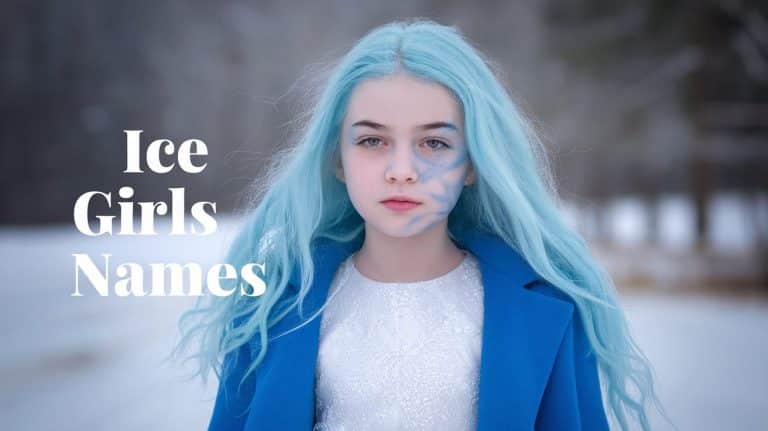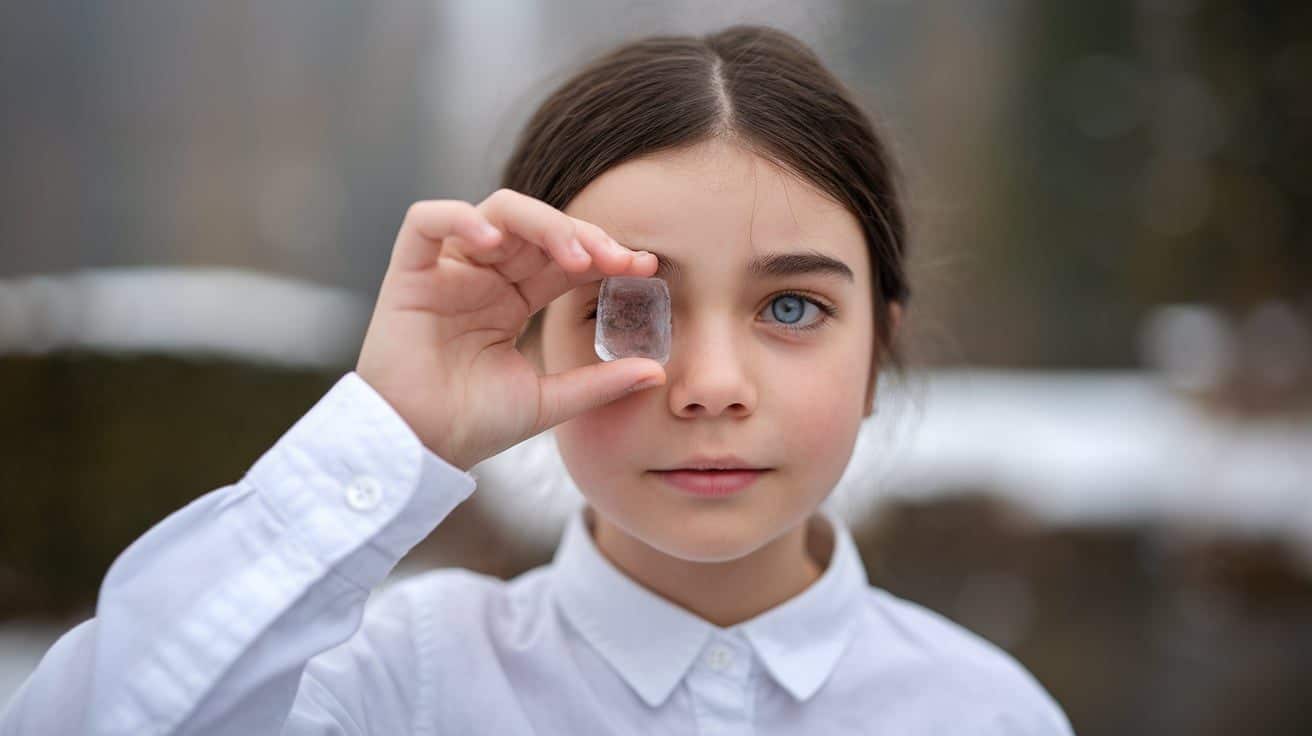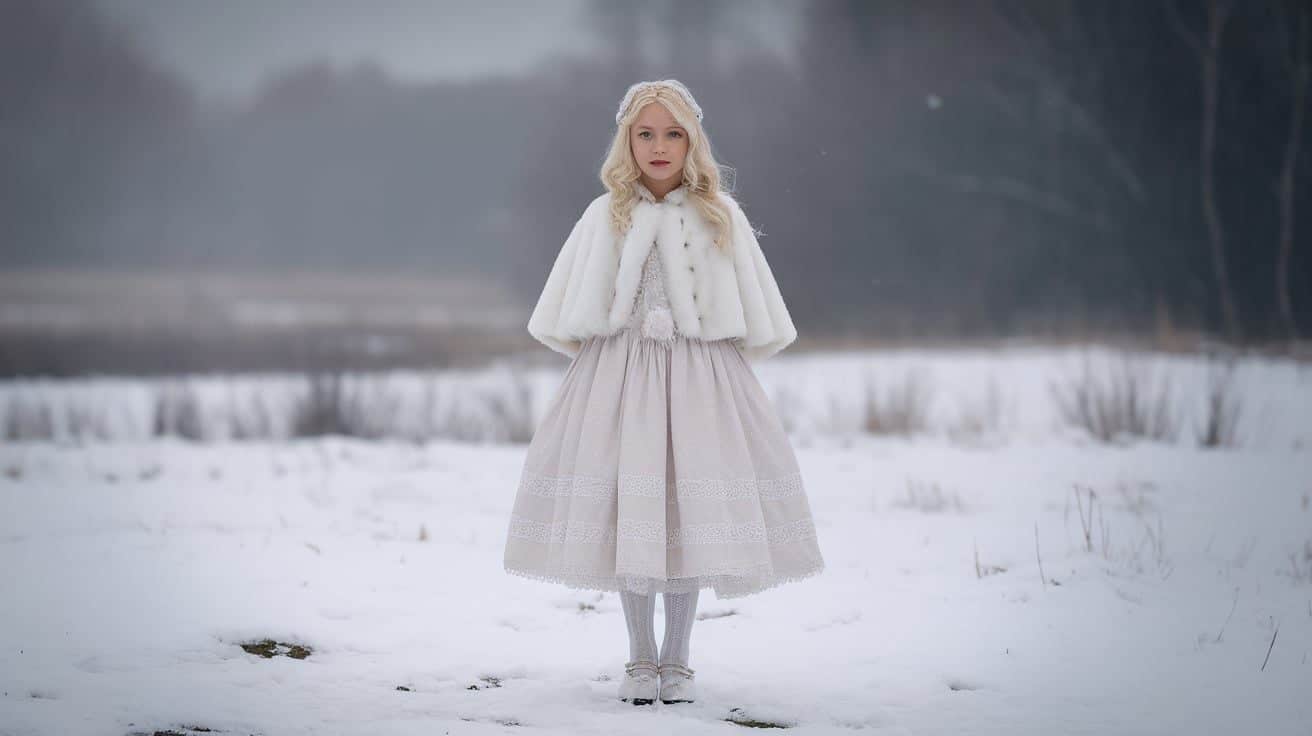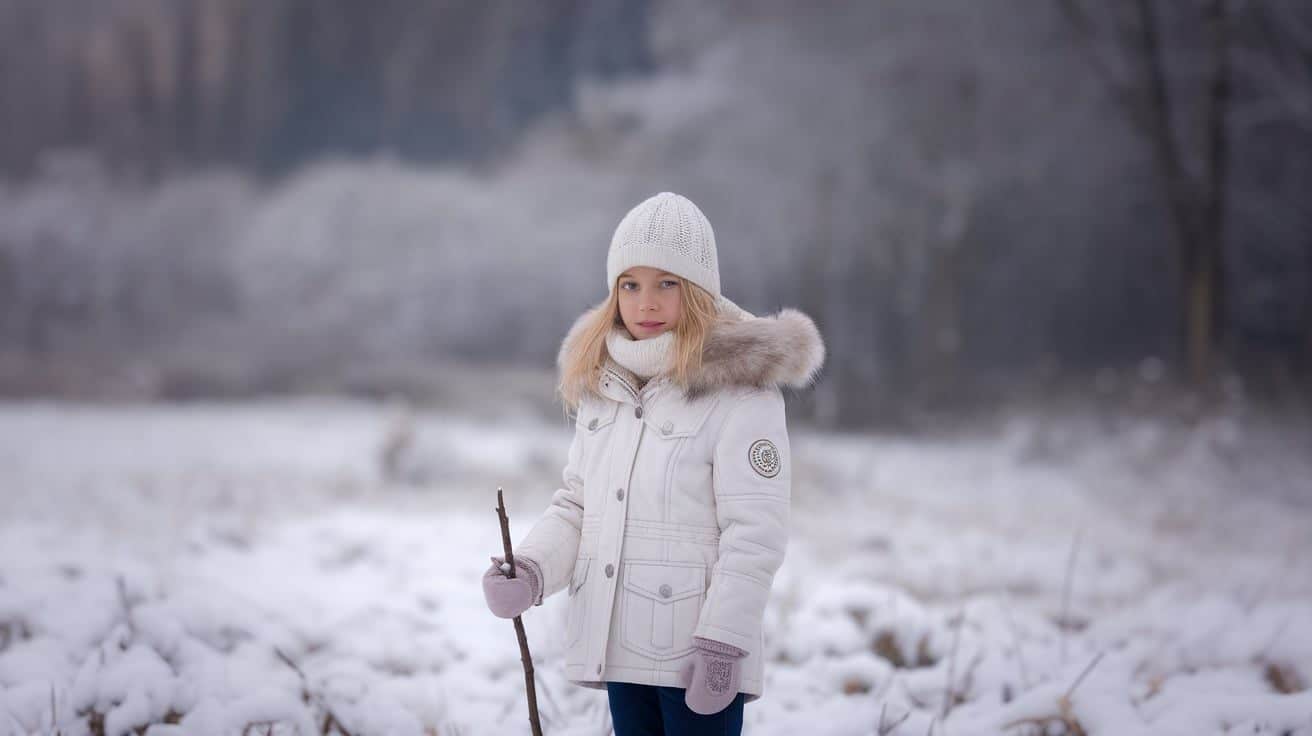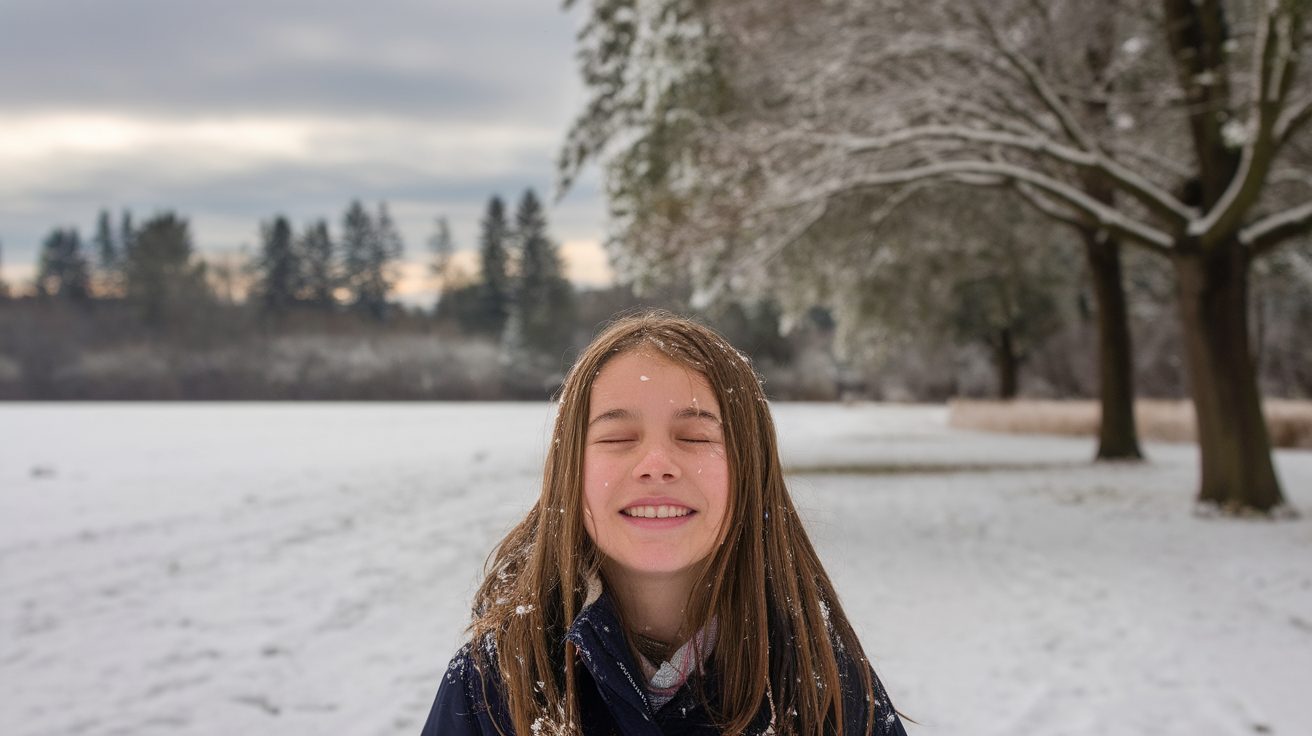Are you looking for some ice-inspired names for girls? Keep reading!
This Blog features selected names with ice and snow themes drawn from various cultural backgrounds and mythologies.
From the Finnish “Lumi,” meaning light and snow, to the Norse “Skadi,” a winter goddess, each name carries its own frosty quality.
Our selection includes names from ancient myths, current interpretations, and cultural traditions with clear meanings and pronunciations.
For writers crafting stories, players making game characters, or anyone interested in names linked to ice and winter, this list offers meaningful choices with historical roots.
Top Picked Ice Girl’s Names
1. Glaciah
- Pronunciation: GLAY-see-ah
- Origin: Latin
- Meaning: Ice
2. Siri
- Pronunciation: SEE-ree
- Origin: Scandinavian
- Meaning: Snow or wind, related to winter elements
3. Breezy
- Pronunciation: BREE-zee
- Origin: English
- Meaning: Light and refreshing, like a cool breeze.
4. Chione
- Pronunciation: KY-oh-nee
- Origin: Greek
- Meaning: Goddess of snow.
5. Crystal
- Pronunciation: KRIS-tuhl
- Origin: Greek
- Meaning: Clear, sparkling ice.
6. Eira
- Pronunciation: AIR-uh
- Origin: Welsh
- Meaning: Snow.
7. Elsa
- Pronunciation: EL-sa
- Origin: German
- Meaning: Derived from “Elizabeth,” meaning “God is my oath” but associated with ice due to the “Frozen” franchise.
8. Frosina
- Pronunciation: FROH-see-nuh
- Origin: Italian
- Meaning: Derived from “frost,” referring to something cold or frozen.
9. Glacia
- Pronunciation: GLAY-sha
- Origin: Latin
- Meaning: Derived from “glacier,” referring to ice or snow.
10. Gwyneira
- Pronunciation: gwuh-NEYE-rah
- Origin: Welsh
- Meaning: Fair snow.
11. Hiel
- Pronunciation: HEE-uhl
- Origin: Old Norse
- Meaning: Derived from “heil,” meaning health, but also associated with icy landscapes.
12. Ice
- Pronunciation: EYES
- Origin: English
- Meaning: Frozen water.
13. Icelyn
- Pronunciation: EYE-suh-linn
- Origin: English
- Meaning: Derived from “ice,” meaning frozen.
14. Icy
- Pronunciation: EYE-see
- Origin: English
- Meaning: Chilled, cold as ice.
15. Isolde
- Pronunciation: ee-ZAHL-duh
- Origin: Celtic
- Meaning: Ice ruler, or ice queen.
16. Jaska
- Pronunciation: YAH-ska
- Origin: Finnish
- Meaning: Derived from the word for ice, but also meaning “gift.”
17. Lumi
- Pronunciation: LOO-mee
- Origin: Finnish
- Meaning: Snow, light.
18. Neva
- Pronunciation: NEE-vah
- Origin: Spanish
- Meaning: Snow, also refers to “snowfall” in some cultures.
19. Norna
- Pronunciation: NOR-nah
- Origin: Scandinavian
- Meaning: A mythical figure associated with ice and the cold.
20. Snow
- Pronunciation: SNOH
- Origin: English
- Meaning: Frozen water vapor that falls as white flakes.
21. Sonja
- Pronunciation: SAWN-yah
- Origin: Slavic
- Meaning: A form of “Sophia,” but often linked to ice due to the “Frozen” character.
22. Storm
- Pronunciation: STORM
- Origin: Old Norse
- Meaning: A strong weather event, often associated with snowstorms or ice storms.
23. Tundra
- Pronunciation: TUN-druh
- Origin: Russian
- Meaning: A cold, treeless plain.
24. Yuki
- Pronunciation: YOO-kee
- Origin: Japanese
- Meaning: Snow.
25. Amaia
- Pronunciation: uh-MY-ah
- Origin: Basque
- Meaning: The end, but also refers to cold, as “Amaia” can be associated with snowy landscapes in some stories.
26. Aurora
- Pronunciation: uh-ROAR-uh
- Origin: Latin
- Meaning: Dawn, related to the aurora borealis, the northern lights often seen in icy regions.
27. Bridget
- Pronunciation: BRIJ-it
- Origin: Irish
- Meaning: Strength, power, but also has associations with ice through stories of the cold goddess.
28. Glacey
- Pronunciation: GLAY-see
- Origin: French
- Meaning: Like ice or glacier.
29. Winter
- Pronunciation: WIN-ter
- Origin: Old English
- Meaning: The coldest season of the year, associated with snow and ice.
30. Sylva
- Pronunciation: SIL-vuh
- Origin: Latin
- Meaning: Forest, but often associated with cold, winter climates.
- Freya
- Pronunciation: FRAY-ah
- Origin: Norse
- Meaning: A goddess associated with love and beauty, also linked to winter and snow in mythology.
- Glace
- Pronunciation: GLASS
- Origin: French
- Meaning: Ice.
- Leia
- Pronunciation: LAY-uh
- Origin: Hebrew
- Meaning: Weary, but often linked to ice through popular culture.
- Frigga
- Pronunciation: FRIG-uh
- Origin: Norse
- Meaning: The goddess associated with cold weather.
- Melantha
- Pronunciation: MEH-lan-tha
- Origin: Greek
- Meaning: Dark flower, but also has frost-related associations.
- Miska
- Pronunciation: MISH-kuh
- Origin: Slavic
- Meaning: A form of “Michael,” but related to cold through cultural references.
- Varda
- Pronunciation: VAHR-dah
- Origin: Norse
- Meaning: Guardian, but often associated with icy landscapes.
- Orla
- Pronunciation: OR-lah
- Origin: Irish
- Meaning: Golden princess, but linked to ice in mythological texts.
- Evana
- Pronunciation: eh-VAH-nah
- Origin: Slavic
- Meaning: “Life,” with some interpretations relating it to icy breath.
- Edra
- Pronunciation: EH-drah
- Origin: Celtic
- Meaning: A form of “Eira,” meaning snow.
- Sinead
- Pronunciation: SHIN-ayd
- Origin: Irish
- Meaning: A form of “Jane,” but sometimes related to cold or winter weather.
- Elva
- Pronunciation: EL-vah
- Origin: Old Norse
- Meaning: White elf, often tied to ice themes.
- Astrid
- Pronunciation: AH-strid
- Origin: Norse
- Meaning: Divine strength, associated with cold places in mythology.
- Sora
- Pronunciation: SOH-rah
- Origin: Japanese
- Meaning: Sky, often depicting the icy cold skies.
- Salma
- Pronunciation: SAL-mah
- Origin: Arabic
- Meaning: Peace, but linked to cold weather and serenity in literature.
46. Alaska
- Pronunciation: uh-LAS-kuh
- Origin: Native American
- Meaning: Great land, often linked to cold, icy regions.
47. Hikari
- Pronunciation: hee-KAH-ree
- Origin: Japanese
- Meaning: Light, often associated with winter sunlight reflecting on snow.
48. Vivalda
- Pronunciation: VEE-val-duh
- Origin: Italian
- Meaning: Lively, but evokes imagery of cold winds in certain contexts.
49. Frosta
- Pronunciation: FROH-stah
- Origin: Norse
- Meaning: Frost
50. Lucinda
- Pronunciation: loo-SIN-dah
- Origin: Latin
- Meaning: Light, associated with light snowfall
51. Zarina
- Pronunciation: zah-REE-nah
- Origin: Slavic
- Meaning: Golden, but associated with ice in wintery tales.
52. Daphne
- Pronunciation: DAF-nee
- Origin: Greek
- Meaning: Laurel tree, associated with cold environments
- Jara
- Pronunciation: JAH-rah
- Origin: Spanish
- Meaning: Snow
- Cyrilla
- Pronunciation: sih-RIL-lah
- Origin: Greek
- Meaning: Mistress, ruler, linked to ice
- Dawn
- Pronunciation: DAWN
- Origin: English
- Meaning: The first light of day, symbolic of the winter dawn
- Kirra
- Pronunciation: KIR-ah
- Origin: Aboriginal
- Meaning: Snow, ice
- Minerva
- Pronunciation: mi-NER-vah
- Origin: Latin
- Meaning: Goddess of wisdom, linked to cool and icy themes
- Elvina
- Pronunciation: el-VEE-nah
- Origin: Old English
- Meaning: Elf friend, ethereal like snow
- Edda
- Pronunciation: ED-dah
- Origin: Old Norse
- Meaning: Great grandmother, linked to old winter tales
- Sigrid
- Pronunciation: SIG-rid
- Origin: Norse
- Meaning: Victory, wisdom, linked to snow and winter
- Ilse
- Pronunciation: IL-seh
- Origin: German
- Meaning: Ice, cold
- Anya
- Pronunciation: AHN-yah
- Origin: Russian
- Meaning: Grace, also linked to cold environments
- Vera
- Pronunciation: VEH-rah
- Origin: Russian
- Meaning: Faith, linked to serene snowfalls
- Eunice
- Pronunciation: YOU-niss
- Origin: Greek
- Meaning: Good victory, connected to cold beauty
- Irma
- Pronunciation: ER-mah
- Origin: Germanic
- Meaning: Strong, universal, inspired by the cold northern winds
- Isla
- Pronunciation: EYE-lah
- Origin: Scottish
- Meaning: Island, symbolizing isolation in icy waters
- Liv
- Pronunciation: LIV
- Origin: Scandinavian
- Meaning: Life, associated with the resilience of life in winter
- Lira
- Pronunciation: LEER-ah
- Origin: Latin
- Meaning: Lyre, associated with the calm of a winter’s night
- Liora
- Pronunciation: LEE-or-ah
- Origin: Hebrew
- Meaning: My light, a soft light in a cold world
- Aster
- Pronunciation: AS-ter
- Origin: Greek
- Meaning: Star, associated with winter constellations
- Emeline
- Pronunciation: EM-uh-leen
- Origin: Latin
- Meaning: Rival, associated with the fierce beauty of winter
- Aska
- Pronunciation: AS-ka
- Origin: Norse
- Meaning: Ash tree, linked to the cold, frozen landscapes
- Zandra
- Pronunciation: ZAN-drah
- Origin: Greek
- Meaning: Defender of the people, cool and collected like ice
- Xenia
- Pronunciation: ZEE-nee-ah
- Origin: Greek
- Meaning: Hospitality, calm like the stillness of winter
- Tyra
- Pronunciation: TY-rah
- Origin: Scandinavian
- Meaning: God of war, cold and powerful like a blizzard
- Maeve
- Pronunciation: MAYV
- Origin: Irish
- Meaning: She who intoxicates, cool like a northern breeze
- Soraya
- Pronunciation: soh-RAY-ah
- Origin: Persian
- Meaning: The Pleiades, stars that shine bright in winter skies
- Inara
- Pronunciation: in-AH-rah
- Origin: Arabic
- Meaning: Ray of light, shining through a frosty sky
- Kendra
- Pronunciation: KEN-drah
- Origin: English
- Meaning: Knowledge, cool and collected like ice
- Kessia
- Pronunciation: KES-see-ah
- Origin: Hebrew
- Meaning: Cassia tree, strong like the icy winter winds
- Tanith
- Pronunciation: TAH-nith
- Origin: Phoenician
- Meaning: Ancient goddess, linked to cold and darkness
- Kiri
- Pronunciation: KEE-ree
- Origin: Japanese
- Meaning: Mist, like the cold mist of winter mornings
- Imara
- Pronunciation: ee-MAH-rah
- Origin: Swahili
- Meaning: Strong, like the icy strength of a frozen land
- Selene
- Pronunciation: seh-LEEN
- Origin: Greek
- Meaning: Moon, reflecting the cool, icy light of the moon
- Tala
- Pronunciation: TAH-lah
- Origin: Native American
- Meaning: Wolf, symbolizing winter’s fierce beauty
- Sabine
- Pronunciation: SAH-been
- Origin: Latin
- Meaning: Sabine woman, strong and resilient like the cold
- Jovi
- Pronunciation: JOH-vee
- Origin: Latin
- Meaning: Joyful, as serene as the calm winter snow
- Trixie
- Pronunciation: TRIK-see
- Origin: English
- Meaning: Bringer of joy, cool and fresh like a winter’s breeze
- Zola
- Pronunciation: ZOH-lah
- Origin: African
- Meaning: Peaceful, cool as a winter breeze
- Imani
- Pronunciation: ee-MAH-nee
- Origin: Swahili
- Meaning: Faith, calm and still like snow
- Kali
- Pronunciation: KAH-lee
- Origin: Sanskrit
- Meaning: Goddess of destruction, strong and cold
- Inga
- Pronunciation: IN-gah
- Origin: Scandinavian
- Meaning: Ice, associated with frozen strength
- Iliana
- Pronunciation: ill-ee-AH-nah
- Origin: Greek
- Meaning: Moon, linked to cold, moonlit nights
- Maera
- Pronunciation: MAY-rah
- Origin: Greek
- Meaning: The one who shines, like winter’s sparkle
- Briza
- Pronunciation: BREE-zah
- Origin: Spanish
- Meaning: Breeze, cold wind
- Vesper
- Pronunciation: VES-per
- Origin: Latin
- Meaning: Evening star, shining cool light
- Sariah
- Pronunciation: sah-RYE-ah
- Origin: Hebrew
- Meaning: Princess, cool and graceful like snow
- Gwyneth
- Pronunciation: GWIN-eth
- Origin: Welsh
- Meaning: Fair, white, snow-like
- Thalia
- Pronunciation: THAH-lee-ah
- Origin: Greek
- Meaning: Blossom, beautiful like frost on flowers
- Liza
- Pronunciation: LIE-zah
- Origin: Hebrew
- Meaning: God’s promise, serene as a winter landscape
- Noelle
- Pronunciation: noh-EL
- Origin: French
- Meaning: Christmas, symbolizing the cool winter season
- Zillah
- Pronunciation: ZIL-ah
- Origin: Hebrew
- Meaning: Shade, cool like the quiet winter night
- Skadi
- Pronunciation: SKAH-dee
- Origin: Norse
- Meaning: Goddess of winter, associated with snow
- Isabell
- Pronunciation: IZ-ah-bel
- Origin: Hebrew
- Meaning: Devoted to God, linked to purity and cold beauty
- Valtine
- Pronunciation: VAL-tine
- Origin: French
- Meaning: Strong, related to the strength of winter
- Aubriana
- Pronunciation: aw-BREE-ah-na
- Origin: Latin
- Meaning: White, symbolizing ice and purity
- Nixie
- Pronunciation: NIK-see
- Origin: German
- Meaning: Water sprite, associated with ice and cold water
- Yseult
- Pronunciation: ee-SOLT
- Origin: Welsh
- Meaning: Fair, linked to winter beauty
- Froska
- Pronunciation: FROH-ska
- Origin: Scandinavian
- Meaning: Snow, ice
- Zuri
- Pronunciation: ZOO-ree
- Origin: Swahili
- Meaning: Beautiful, cool and graceful
- Nephele
- Pronunciation: NEF-eh-lee
- Origin: Greek
- Meaning: Cloud, symbolizing the coldness of winter clouds
- Aria
- Pronunciation: AH-ree-ah
- Origin: Italian
- Meaning: Air, wind, linked to cold breezes
- Nieve
- Pronunciation: NEE-eh-veh
- Origin: Spanish
- Meaning: Snow
- Gelato
- Pronunciation: jeh-LAH-toh
- Origin: Italian
- Meaning: Frozen dessert, like ice cream
- Polara
- Pronunciation: poh-LAR-ah
- Origin: Latin
- Meaning: Polar, associated with cold climates
- Fira
- Pronunciation: FEE-rah
- Origin: Greek
- Meaning: Ice, frost
- Icelynn
- Pronunciation: EYE-suh-linn
- Origin: English
- Meaning: Ice-like
- Shiver
- Pronunciation: SHIV-er
- Origin: English
- Meaning: To tremble from cold
- Snowflake
- Pronunciation: SNOW-flake
- Origin: English
- Meaning: Frozen crystal
- Hiela
- Pronunciation: HEE-eh-lah
- Origin: Old Norse
- Meaning: Snow, ice
- Krista
- Pronunciation: KRIS-tah
- Origin: Greek
- Meaning: Christ-like, associated with purity and ice
- Igla
- Pronunciation: IG-lah
- Origin: Russian
- Meaning: Ice
- Eisley
- Pronunciation: EYE-slee
- Origin: English
- Meaning: Ice-covered meadow
- Vikka
- Pronunciation: VEE-kah
- Origin: Scandinavian
- Meaning: Ice
- Krystal
- Pronunciation: KRIS-tuhl
- Origin: Greek
- Meaning: Ice-like, clear
- Kalix
- Pronunciation: KAY-liks
- Origin: Latin
- Meaning: Ice, frost
- Frigid
- Pronunciation: FRIJ-id
- Origin: English
- Meaning: Extremely cold
- Frostine
- Pronunciation: FROS-teen
- Origin: English
- Meaning: Frost, icy cold
Conclusion
Each name in this collection carries a winter-inspired meaning, drawing from different languages and cultural backgrounds.
While some reference actual ice and snow, others connect to winter through their cultural significance or seasonal ties.
These names offer more than just cold-weather connections – they bring forth images of sparkling snow, northern lights, winter skies, and the quiet beauty of frost-covered landscapes.
Whether you’re naming a character in a story or searching for a name with ties to winter’s splendor, we trust this selection helps you find what you’re looking for.
Remember that pronunciation guides and origin details can help you make an informed choice that fits your needs while honoring the cultural heritage behind each name.
We’d love to hear which names caught your attention or if you know other winter-themed names to add to this collection.

